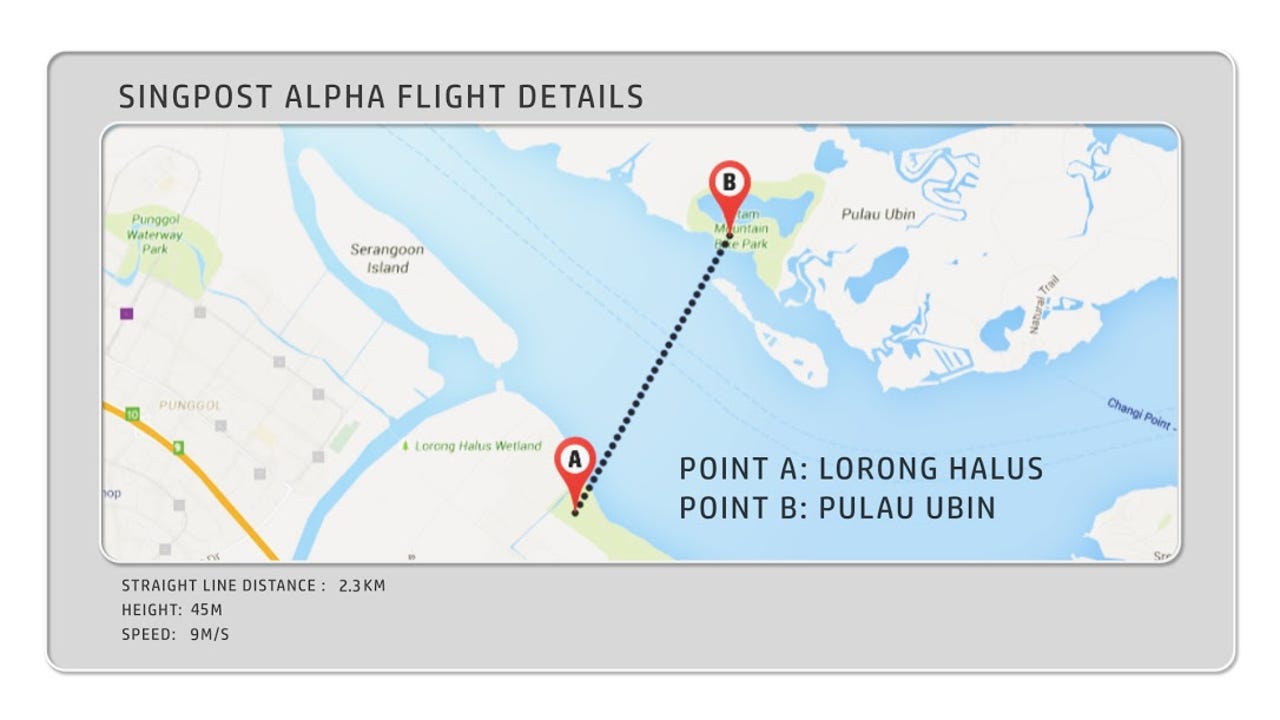SingPost test drives drone delivery, but no firm commercial plans


In a joint development with the country's ICT regulator Infocomm Development Authority (IDA), the drone delivery was successfully completed between Lorong Halus and Pulau Ubin, crossing seawater to reach the small island located in the eastern part of Singapore.
The test flight took five minutes, carrying a package comprising a letter and a t-shirt, and flew a distance of 2 kilometres. The drone is equipped with security features, including a prototype app designed with verification functions to ensure its delivery is made to its intended recipient. It has the capacity to carry a payload of up to 500 grams and can fly at a height of up to 45 metres and to a distance of up to 2.3 kilometres, SingPost said, adding that the pilot flight was focused on testing the drone technology and safety boundaries.
The UAV operated on the Pixhawk Steadidrone platform developed by IDA Labs and "tailored" for deployment in the island-nation, SingPost said.
A spokesperson told ZDNet the platform was based on an open source software "with some modifications", with the authentication app embedded in the drone's firmware. She added that the pilot ran for three months, achieving an accuracy rate of "close to 100 percent".
Asked about the security features, she noted that should the drone fail to authenticate the recipient within 30 minutes, it would activate a timeout and fly back to its original location. She added that the delivery date and time could be scheduled via a dashboard on a mobile device.
The app ran on the Android OS and was developed as an enterprise app, so it would not be available to consumers. SingPost would be running more trials and gathering user feedback before deciding what further enhancements to include.
No firm plans had been made as yet on when the drone delivery would be commercially launched, or which areas within Singapore it would be made available.
"We do not have any plans at this stage as we are still exploring drone technology and its commercial viability," said the SingPost spokesperson, adding that the company would still need to ensure it made economic sense to offer the service commercially.
"We do not have plans in place on price structure and will have to evaluate the unit economics first, so it is still too early to tell," she said.
According to SingPost, the pilot was part of its efforts to improve point-to-point services to support urban logistics. It also was aiming to tap e-commerce growth in the Asia-Pacific region, which was projected to hit $175 billion by 2016.
Noting that SingPost was keen to expand its traditional mail delivery model to include new innovative services, IDA's managing director Jacqueline Poh said: "Although it will be a while before it is viable for drone mail delivery to take off in Singapore, taking into consideration commercial and safety factors, this first step by SingPost and IDA demonstrates what Singapore is trying out with our smart nation vision -- to have the various parts of our ecosystem collaborate, experiment with new ways of doing things, and in the process, literally aim for the sky with new technology."
SingPost Head of Digital Services Bernard Leong said: "There is immense potential in UAV technology for last-mile mail and e-commerce delivery. As SingPost transforms into an e-commerce logistics enabler, we will continue to collaborate with industry leaders and chart new frontiers."
The pilot also involved collaboration with various government agencies and authorities as approvals were necessary to facilitate the flight test, including Ministry of Transport, Civil Aviation Authority of Singapore, Maritime and Port Authority of Singapore, Republic of Singapore Air Force, and Singapore Police Force.
The Unmanned Aircraft Systems (UAS) Committee also helped facilitate the trial. Its chairman and Permanent Secretary of the Ministry of Transport, Pang Kin Keong, said: "The [UAV] technology opens up numerous exciting possibilities that can help us enhance operational productivity, efficiency, and effectiveness. All this, of course, needs to be carried in a safe manner, both for the public as well as aviation."